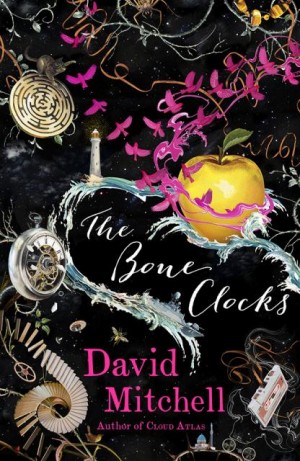You have no items in your cart. Want to get some nice things?
Go shopping When teenage runaway Holly Sykes comes across a strange old lady on the Kent coast, she accepts a drink of green tea in return for “asylum”, not knowing or caring what sort of asylum she may be required to offer up. The Bone Clocks follows Holly’s life from her adolescence in Gravesend to her old age in the west of Ireland through a series of episodes told from different points of view — as she finds herself embroiled in a bizarre supernatural feud.
When teenage runaway Holly Sykes comes across a strange old lady on the Kent coast, she accepts a drink of green tea in return for “asylum”, not knowing or caring what sort of asylum she may be required to offer up. The Bone Clocks follows Holly’s life from her adolescence in Gravesend to her old age in the west of Ireland through a series of episodes told from different points of view — as she finds herself embroiled in a bizarre supernatural feud.
The novel bears all of David Mitchell’s literary hallmarks: exquisite prose and a big canvas, both in terms of time and place. The characters are rounded and believable, and linked not only to each other through Holly and the metaphysical story that emerges more boldly in each part, but in many cases to the author’s previous novels.
Mitchell is a gifted storyteller and employs this talent to manipulate his readership. He eases you gently into Holly’s story, with a few, slightly confusing metaphysical episodes that confuse and terrify both protagonist and reader. The book becomes even harder to put down by the second part, where it cranks up the tension and the intellectual voltage.
Power is lost or won, never created or destroyed. Power is a visitor to, not a possession of, those it empowers. The mad tend to crave it, many of the sane crave it, but the wise worry about its long-term side-effects. Power is crack-cocaine for your ego and battery-acid for your soul.
Mitchell only gives enough of the metaphysical world to whet the reader’s curiosity, writing a story (or stories) grounded in realism that both disturb and amuse. He alternately takes digs at overprivileged Cambridge students, describes the Iraq War in harrowing detail, and lampoons the literary world with witty observations. He plays with his different worlds and, pushes the boundaries of possibility in both the story and the form. Just as his characters are teased and bewildered by the parallel universe that runs alongside their existence, and is so clearly out of their control, so too is the reader.
But the suspense is difficult to apprehend. The metaphysical plot is complicated and hard to follow even despite an in-depth explanation of goings-on. A new set of characters use a technical terms that sometimes feel a bit geeky — more Star Trek or Dr Who — than literary fiction. In many ways, that’s a good thing. Why shouldn’t television influence novel-writing?
And why shouldn’t modern authors (and so few dare to) force us to contemplate the world we live in? In the final part of the book, for instance, Holly considers her “grief for the regions we deadlanded, the ice caps we melted, the Gulf Stream we redirected, the rivers we drained, the coasts we flooded, the lakes we choked with crap, the seas we killed, the species we drove to extinction, the pollinators we wiped out, the oil we squandered, the drugs we rendered impotent, the comforting liars we voted into office – all so we didn’t have to change our cosy lifestyles.”
The Bone Clocks is an ambitious, thought-provoking novel and David Mitchell is certainly one of the most exciting and groundbreaking novelists working today. A stimulating read and worth coming back to.

About Juno Baker
Juno Baker is a freelance writer, and editor of the University of Cambridge's Leading Change website. She has written articles for the Guardian and once interviewed Dolly Parton. Her fiction has been placed in several competitions – including Winchester Writers Festival, Pindrop, Short Fiction and Rubery – and was recently shortlisted for the VS Pritchett Short Story Prize. Her stories have also appeared in numerous magazines and anthologies, most recently, Mslexia, Unthology and Litro.
- Web |
- More Posts(13)




